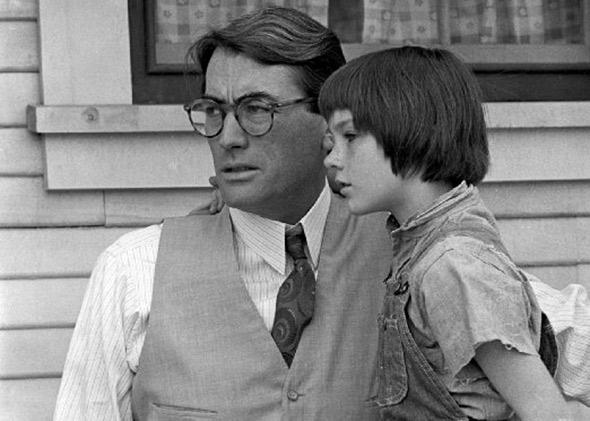To Kill a Mockingbird, a perpetual best-seller since its publication in 1960, knows how to generate competing storylines. Its author, Harper Lee, after all, never followed up with a second novel, and many wondered whether she had even written the first. And its protagonist, Atticus Finch, ended up becoming even more famous than the novel itself.
That’s why the announcement that Lee is publishing an unexpected sequel, Go Set a Watchman, scheduled for release this summer, with Atticus Finch returning to his familiar role as a righteous lawyer, is such big news (along with the revelation that Lee actually wrote the book before the original).
If there were a Mount Rushmore for American fiction, Atticus Finch would surely be on it, in the same way that To Kill a Mockingbird is virtually carved into most bookshelves. The Pulitzer Prize–winning novel has sold more than 40 million copies and has been translated into 40 languages. Long before John Grisham, Scott Turow, and Michael Connelly turned courtroom dramas into popular culture, it was the first legal blockbuster.
It’s the story of a crusading lawyer, Atticus Finch, told from the perspective of his daughter, Scout, who is recalling her childhood, when the Jim Crow laws of the Deep South tormented the lives of those who had only recently been emancipated. Atticus represents Tom Robinson, a black man falsely accused of raping a white woman. The trial doesn’t end well, but Atticus’ fight for moral truth and racial justice—despite overwhelming odds and the contempt of his community—demonstrates his measure as a man and his virtue as an attorney.
Go Set a Watchman commences 20 years later when Scout returns home, discovers further racial tensions and social upheavals, and resumes her complicated relationship with Atticus.
Apparently a lot of people have some kind of relationship with the mythical Atticus Finch. He is one of America’s most admired and enduring fictional characters. In 2003, in the guise of Gregory Peck who portrayed him in the 1962 film, he topped the list of the American Film Institute’s 100 greatest movie heroes, beating out Indiana Jones and James Bond. The American Bar Association’s ABA Journal crowned him America’s favorite fictional lawyer in 2010. Babies are named after him. Indeed, despite his many parental shortcomings, he is the father many wish for themselves.
This hero worship is even more pronounced among lawyers. Atticus Finch is invoked as a guiding influence more frequently in essays for law school admission than any other factor by far. His name is synonymous with moral perfection, his quiet dignity the standard of ethical conduct; he is the undisputed MVP of the ABA.
I have taught the novel to hundreds of law students. Few haven’t imagined re-enacting his famous summation before the small-town jury in Maycomb County, Alabama, when he intones that “courts are the great levelers, and in our courts all men are created equal.” Before embarking on their legal careers, law students say that Atticus is the lawyer they most want to be.
Atticus is the antithesis of the hired gun. (Although in the novel he is portrayed, surprisingly, as quite a shot.) He practices law alone, with only one three-piece seersucker suit. His clients generally remain in his debt, and he is surely not out for a fast buck. He can accept incremental advances in the law as victories, and he doesn’t insist on scorching the earth. He never screams at a clerk or intimidates a witness. He is reverent about the truth.
Atticus Finch wouldn’t be caught dead defending O.J. Simpson.
With law school applications down nationwide and public cynicism about the legal profession widespread, it’s worth speculating on why the example set by Atticus Finch does not carry over more into the actual practice of law. Apparently, upon graduation, most law students lose their inner Atticus Finch. The inspiration that once hailed personal honor and the public good as fundamental values of the bar disappears in a haze of student debt and the allure of financial reward.
Heroism is the handiwork of fictional characters, not senior associates.
Atticus Finch admiration transcends the legal profession, although often with the same results. Perhaps he is too pure to emulate. After all, Atticus draws no distinction between his moral life as a father and his professional duty as an attorney. Throughout the novel he insists that should he fail to do the right thing and not defend Tom Robinson, he would forfeit his moral authority to parent his children and walk honorably within his community.
How many parents teach such lessons to their children and apply the same moral criteria to their day jobs? Acting against self-interest and bounded by moral conviction is the very essence of Atticus Finch.
Word of Go Set a Watchman arrives amid new racial turmoil. There have been protests in Ferguson, Missouri, and New York City; many people wonder whether justice for a black man is impossible—even today, without Jim Crow and with a black president.
Atticus Finch’s return to the public’s consciousness comes at a prescient moment. In Go Set a Watchman, he may be older and perhaps no longer the eagle-eyed “One-Shot” he once was. Yet, with our institutions failing, Atticus is a welcome sight. If nothing else, this fortuitous sequel to Harper Lee’s masterpiece will remind readers how a fictional character has, often uneasily, influenced the moral development of a nation, and may do so again.
